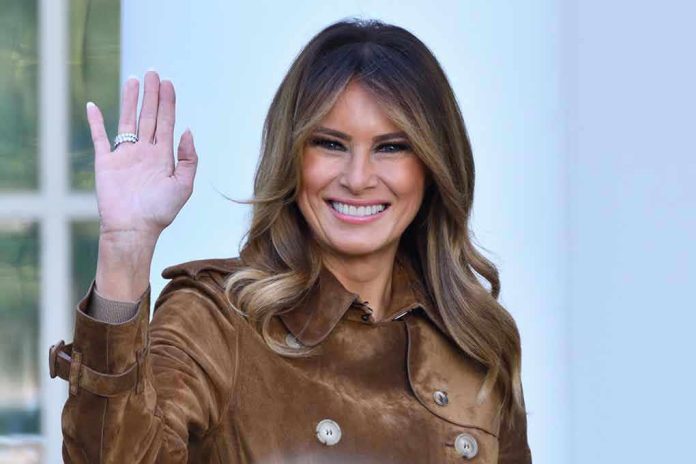
Melania Trump’s bold rejection of Vanity Fair’s cover offer exposes the absurdity of media bias and elitism.
Story Highlights
- Melania Trump declined a Vanity Fair cover offer, sparking media frenzy.
- The rejection highlights ongoing tension between conservative figures and mainstream media.
- Supporters praise Melania for standing up against media elitism.
- The incident underscores the divide between traditional values and media narratives.
Melania Trump’s Rejection of Vanity Fair
In a striking move that has captured national attention, First Lady Melania Trump reportedly laughed off an offer to feature on the cover of Vanity Fair. This decision, confirmed by sources close to Melania, has sent shockwaves through the media world, highlighting the ongoing tension between conservative figures and mainstream media outlets. By rejecting the offer, Melania has once again positioned herself as a figure unafraid to challenge the status quo.
Melania’s decision comes at a time when many conservatives feel underrepresented and often mischaracterized by the media. Her rejection of Vanity Fair is seen by supporters as a stand against media elitism and bias, particularly from outlets that have historically leaned left in their coverage. In the eyes of her supporters, this bold act is a reaffirmation of her commitment to conservative values and her refusal to be co-opted by media narratives that do not align with her principles.
Media’s Reaction and Public Response
The media’s response to Melania’s rejection has been swift and varied. Vanity Fair staff reportedly felt slighted by the First Lady’s refusal, leading to internal discord. Some media outlets have attempted to spin the story to suggest Melania’s decision was a missed opportunity, while others have criticized her for not engaging with a broader audience. However, among conservative circles, her choice has been met with widespread approval, with many applauding her for staying true to her values.
Public reactions have mirrored these media narratives, with supporters expressing admiration for Melania’s stance. Social media platforms are abuzz with both praise and criticism, reflecting the wider societal divide. Many conservatives view Melania’s decision as a rejection of an industry they perceive as increasingly out of touch with traditional American values. The incident has further fueled discussions about media representation and the role of conservative voices in shaping public discourse.
Implications for Conservative Media Relations
Melania Trump’s rejection of Vanity Fair is more than just a media story; it is a reflection of the broader cultural and political dynamics at play. Her stance is seen as emblematic of a growing resistance among conservative figures to engage with media outlets perceived as hostile or biased. This incident underscores the need for media organizations to bridge the gap between their editorial lines and the values of a significant portion of the American populace.
For the conservative community, Melania’s decision is a victory, symbolizing a refusal to conform to the pressures of media narratives that often undermine or misrepresent their values. It serves as a reminder of the importance of preserving individual liberty and resisting the influence of media conglomerates that prioritize sensationalism over balanced reporting. The First Lady’s actions resonate with those who advocate for a return to traditional principles and the protection of family and national values.
Sources:
Melania Trump ‘laughed’ at Vanity Fair offer, rejected magazine: sources
Encounters with the Information Society (James Stewart, 2002)




